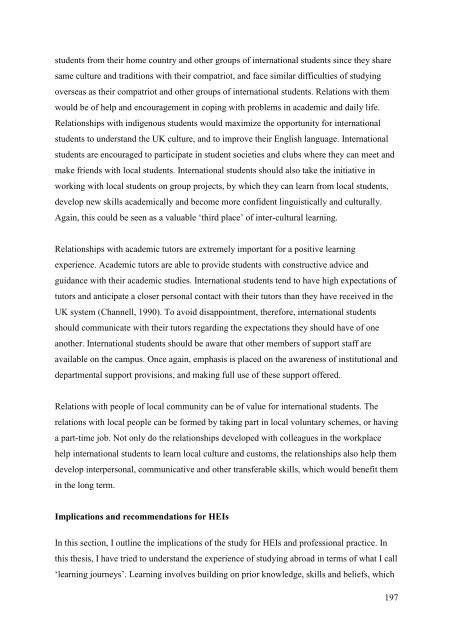The challenge of academic writing for Chinese students within ...
The challenge of academic writing for Chinese students within ...
The challenge of academic writing for Chinese students within ...
Create successful ePaper yourself
Turn your PDF publications into a flip-book with our unique Google optimized e-Paper software.
<strong>students</strong> from their home country and other groups <strong>of</strong> international <strong>students</strong> since they share<br />
same culture and traditions with their compatriot, and face similar difficulties <strong>of</strong> studying<br />
overseas as their compatriot and other groups <strong>of</strong> international <strong>students</strong>. Relations with them<br />
would be <strong>of</strong> help and encouragement in coping with problems in <strong>academic</strong> and daily life.<br />
Relationships with indigenous <strong>students</strong> would maximize the opportunity <strong>for</strong> international<br />
<strong>students</strong> to understand the UK culture, and to improve their English language. International<br />
<strong>students</strong> are encouraged to participate in student societies and clubs where they can meet and<br />
make friends with local <strong>students</strong>. International <strong>students</strong> should also take the initiative in<br />
working with local <strong>students</strong> on group projects, by which they can learn from local <strong>students</strong>,<br />
develop new skills <strong>academic</strong>ally and become more confident linguistically and culturally.<br />
Again, this could be seen as a valuable ‗third place‘ <strong>of</strong> inter-cultural learning.<br />
Relationships with <strong>academic</strong> tutors are extremely important <strong>for</strong> a positive learning<br />
experience. Academic tutors are able to provide <strong>students</strong> with constructive advice and<br />
guidance with their <strong>academic</strong> studies. International <strong>students</strong> tend to have high expectations <strong>of</strong><br />
tutors and anticipate a closer personal contact with their tutors than they have received in the<br />
UK system (Channell, 1990). To avoid disappointment, there<strong>for</strong>e, international <strong>students</strong><br />
should communicate with their tutors regarding the expectations they should have <strong>of</strong> one<br />
another. International <strong>students</strong> should be aware that other members <strong>of</strong> support staff are<br />
available on the campus. Once again, emphasis is placed on the awareness <strong>of</strong> institutional and<br />
departmental support provisions, and making full use <strong>of</strong> these support <strong>of</strong>fered.<br />
Relations with people <strong>of</strong> local community can be <strong>of</strong> value <strong>for</strong> international <strong>students</strong>. <strong>The</strong><br />
relations with local people can be <strong>for</strong>med by taking part in local voluntary schemes, or having<br />
a part-time job. Not only do the relationships developed with colleagues in the workplace<br />
help international <strong>students</strong> to learn local culture and customs, the relationships also help them<br />
develop interpersonal, communicative and other transferable skills, which would benefit them<br />
in the long term.<br />
Implications and recommendations <strong>for</strong> HEIs<br />
In this section, I outline the implications <strong>of</strong> the study <strong>for</strong> HEIs and pr<strong>of</strong>essional practice. In<br />
this thesis, I have tried to understand the experience <strong>of</strong> studying abroad in terms <strong>of</strong> what I call<br />
‗learning journeys‘. Learning involves building on prior knowledge, skills and beliefs, which<br />
197


